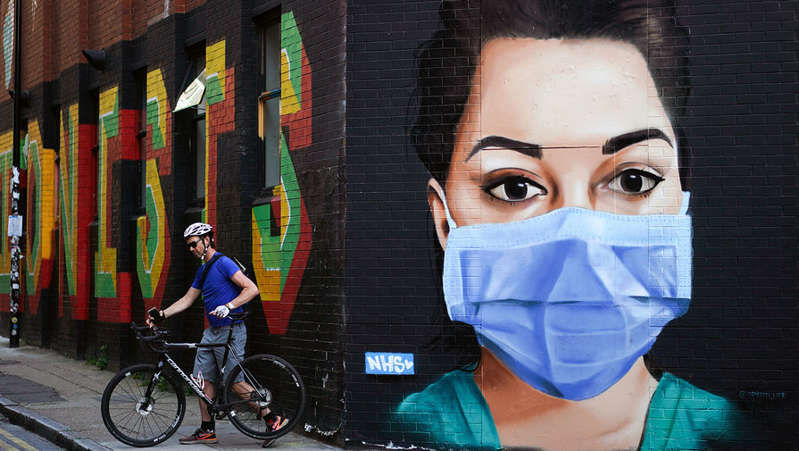
Coronavirus symptom characteristic only for vaccinated people revealed in UK
The ZOE COVID Symptom Study, which specializes in the study of COVID-19, spoke about a new symptom characteristic of those vaccinated against coronavirus.
As shown by the study, the data of which leads the British tabloid The Express, the very fact of vaccination has already proven its effectiveness. However, it is no secret that vaccinated people can be re-infected, while with a high degree of probability, due to the vaccine, they will transfer the disease more easily. The specialists of the research group, in turn, managed to establish one symptom that will help those vaccinated to understand that they have contracted the coronavirus.
So, vaccinated people infected with COVID-19 have frequent sneezing, which may be a sure sign of infection. It explains that in most cases sneezing is not a symptom of coronavirus and is more relevant for colds and allergies.
But people who have been vaccinated and sneeze without a logical explanation of the reasons should pay special attention to this.
“While many people with COVID-19 can sneeze, this is not a clear symptom because sneezing is very common. Especially during the warmer months, when people can experience hay fever, ”the researchers concluded.
Nevertheless, scientists urge not to forget that in the overwhelming majority of cases it is worth paying attention to other symptoms that speak of COVID-19.
The most common classic types of infection remain: anosmia and dysgeusia (that is, a change or loss of smell and taste, respectively), fever, dry cough, unusual fatigue, headache, as well as pain in the chest, throat or muscles, shortness of breath, lack of appetite, runny nose, red and painful fingers and toes, and gastrointestinal disturbances (nausea, vomiting, diarrhea).
The Russian Ministry of Health on its official resources emphasizes that the course of COVID-19 is most often similar to ARVI or influenza.
Scientists from other countries have repeatedly noted the rare symptoms faced by patients with coronavirus.
Spanish specialists from a field hospital in Madrid found that sometimes patients complain of swelling and inflammation of the tongue, as well as tubercles and spots on it. In some patients, a burning sensation was observed in the palms and feet. At the same time, the Spaniards do not recommend using these symptoms as an unambiguous indicator of COVID-19, since they were found only in a certain category of patients – these are adults with pneumonia.
Natalie Lambert, associate professor at the American School of Medicine at Indiana University, speaking about the atypical clinical manifestations of COVID-19, called sudden blackouts, insomnia, unexplained skin rashes, numbness of the face and bodies, and hair loss. And scientists from the University of Liverpool suggested that an atypical lesion of the pancreas may also be associated with coronavirus, but this applies mainly to those infected who are obese.
At the same time, Sergei Osminin, associate professor of the Department of Faculty Surgery No. 1 of the Sklifosov Sechenov University Institute of Clinical Medicine, said in a conversation with the Moskva agency that diseases of the gastrointestinal tract are becoming common in patients who have undergone coronavirus who have not previously encountered such problems.
It is also important that this year the so-called “Indian” strain is becoming the dominant variety of COVID-19. Delta, which has spread widely across Russia in the last month, has significant differences in symptoms. In comparison with the Wuhan variant, those infected with Delta often do not lose their sense of smell, and the course of the infection resembles gastric poisoning: they encounter abdominal pain, diarrhea, and diarrhea.
There are options in which patients develop blood clots, leading to gangrene, and hearing impairment.
Directly in India, against the backdrop of the outbreak, the “Delta” also faced an epidemic of “black mold”, the rate of infection of which increased by 150%. This fungal disease is called mucormycosis and most often affects patients with COVID-19 due to the fact that the immune system of patients with coronavirus is weakened, thereby more susceptible to fungal diseases. It must be understood that this is not an unambiguous sign of COVID-19, but rather its consequence.
“Black mold” causes symptoms such as blackening of the facial skin, shortness of breath, weight loss, bleeding. The consequences of mucormycosis are dangerous: the infection can lead to blindness, removal of the nose, eyes and part of the jaw. Deaths are also frequent. In addition to “black mold”, three more “colored” post-like fungi were found in India – “green”, “white” and “yellow”. These are potentially fatal and more dangerous forms of the disease and, moreover, can coexist simultaneously in the human body.
However, according to doctors, Russia is not threatened by “mold”, since the appearance of fungal epidemics is typical for countries with unsanitary living conditions and hot climates.

